Women of Glory
DETERMINATION WAS HER MIDDLE NAME –
HELEN KELLER
Since August 24, 2010 a special series ‘Women of Glory’ is being aired on Radio Sai every Tuesday to spotlight distinguished women of the world. The fifth episode scheduled for September 21 offers a glimpse of the glorious life of one of the most optimistic, exemplary and determined role models in history, who redefined the very concept of disability. Hellen Keller is not just an American heroine but a real role model to the world and an inspiration to millions.
Below is the link to listen to this programme as well as the text of this presentation which has been produced by the students of the Anantapur campus of Sri Sathya Sai Institute of Higher Learning.
Listen to the Radio program:
“Women of Glory: Determination was her middle name – Hellen Keller”
 |
click here to listen to the Radio programme |
Audio-visual impairment once described as deaf blindness is a combination of both seeing and hearing disability which interferes with the person’s effective functioning in our hearing-sighted world. People who have such challenges have problems of communication, mobility and other routine skills that make life more difficult. Their world can be dark, silent and isolated. Very few have "overcome" these disabilities thoroughly. One spectacular example is that of Helen Keller.
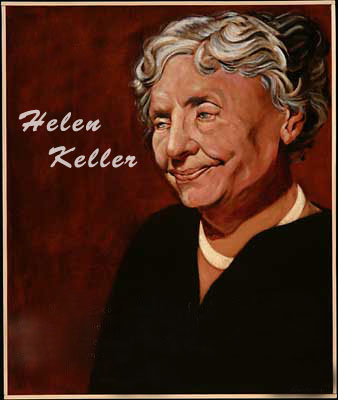 |
Helen Keller - Himalayan Self-Confidence
Helen Keller was born in 1880 and died in 1968 at the age of 88. At age two, she contracted an illness that left her blind, deaf, unable to speak, and was considered backwards of intelligence. She lived in a dark and hopeless world of her own, until age 7, when she was placed in the care of her teacher, Anne Sullivan who brought forth her intellectual and emotional abilities, making Helen Keller the first deaf/blind person to graduate from college.
As an adult, she travelled the world, campaigned for civil rights, world peace, human dignity and women's rights, and authored many books and essays. In her lifetime she became a prominent figure whose accomplishments attracted awe, respect, admiration and inspiration.
Helen not only overcame the physical challenges of speech and hearing disability but also the formidable social obstacles that people with such disadvantages face. Though this happened towards the end of the nineteen century, her story retains its power to startle and inspire even now.
Helen Keller – A Powerful and Eternal Inspiration
Take the example of Vani, a struggling young teacher who lives in Bangalore, India.
Vani is an educator in an elementary school in the city. She has some disinterested and unmotivated students in her class and a family member’s recent disability, added to her woes. Providence has Vani run into her classmate Lata and Geeta from her alma mater, the Sri Sathya Sai Institute of Higher Learning, Anantapur campus.
Both Lata and Geeta have just finished a workshop on Helen Keller’s life. Highly inspired by her story, they provide just the right antidote to the young teacher’s angst and despair.
Here is now the meeting goes:
Lata and Geeta: Sai Ram Vani, how are you?
Vani: Sai Ram Lata and Geeta, how nice to meet you both.
Lata: So Vani, how is your life going on? Why do you look so run down?
Vani: Things are a bit tough for me these days. I am really struggling at work and home.
Geeta: Oh…that’s sad to hear. What happened?
Vani: Well, it’s just that these days I feel rather overwhelmed with so many challenges to deal with.
Geeta: We are sorry to hear you sound so low. Come take a seat. Do share with us what exactly is wrong?
Lata: Do be Frank. What’s really troubling you?
Vani: Well, last year was hard on us. First my little cousin Anita met with an accident a few months ago, and lost her eye sight. The entire family is plunged into a deep depression thinking how this young girl will go through life without her sight.
And if that is not enough, my classroom has serious discipline problems. I am unable to control some of my students; they are consistent under achievers in all areas of learning.
I am unable to engage their attention and feel like I am failing as a teacher. You know when I graduated from the Teaching Program at Anantapur college, I promised our revered Chancellor Bhagavan Baba that I would be a dedicated teacher, but now I am not sure if I am living up to His expectations.
Lata: Even as I feel so sad to hear about your situation, I have goose flesh listening to you because of where Geeta and I are just coming from.
Geeta: Ya… me too. This is truly an example of the law of synchronicity at work. It’s like we have met her not by accident or coincidence but as a result of a divine plan.
Vani: What do you mean by that Geetha?
Lata: You see Vani, during the holidays, both Geeta and I participated in a workshop that changed our perspective on handling disabilities and challenges in life.
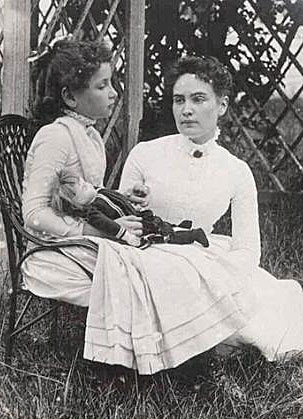 |
Geeta: We are all fired up with inspiration after our workshop and now you tell us of your difficulties which we now know can be handled well by learning from the remarkable life of Helen Keller.
Vani: Helen Keller! Of course I know a little about her life –that blind-deaf-mute girl - but am eager to learn more, especially how her story is relevant to my situation.
Lata: You see Vani, Helen Keller was born in 1880, June 27th to be precise, in Tuscumbia Alabama, USA. She was a normal healthy child at birth, but when she was 19 months old she suffered from a strange disease leading to brain and stomach congestion. This disease left her blind, deaf and therefore dumb. Helen struggled to articulate her needs, emotions and thoughts, but could not do so in any way. Out of shear distress she used to throw tantrums or burst into tears clinging to her mother desperately.
Geeta: But the turning point in her life came on March 3, 1887, when she was about to be 7 years old. That’s when her teacher or shall we say God in the form of her teacher Anne Sullivan entered her life.
Lata: Yes, it was as though the cosmos had heard her cries and sent the right teacher at the right moment.
Vani: You mean just as it happened in the life of Paramahansa Yogananda – with Sri Yukteshwar Giri appearing at the critical moment of Yogananda’s despair?
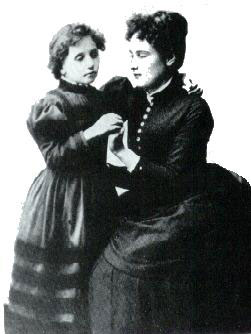 |
Lata: Yes, indeed! Her teacher Anne Sullivan entered her life when she was in great need, when she felt suffocated in the prison of her own self. Imagine a situation when you cannot speak or hear or see, and find it extremely difficult to express about anything going on within you.
Vani: Oh! That would have been unbearable.
Lata: But God is great.
Vani: Baba tells us that the term “guru” or teacher refers to the one who dispels our darkness.
Lata: In this case, Anne Sullivan did so literally by pulling this child out of the dark pit of dejection, frustration and depression that her blindness and deafness caused.
Vani: From the sound of it, it seems like Anne Sullivan was “God sent” both literally and metaphorically.
Geeta: Yes, you got that right. Helen Keller's real life began eventfully on that day – March 3, 1887.
Lata: And on that eventful afternoon, Helen sensing that something important was going to happen to her, opened the door, waited on the steps and stretched out her arms the way she did to her mother and she was caught warmly and closely in the new arms of the lady who had come to reveal all things to Helen.
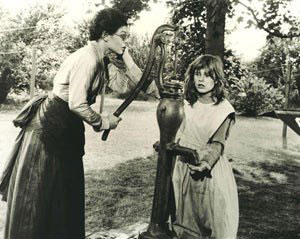 |
Geeta: To start of their relationship on a friendly note, Miss Sullivan gave her a doll the children at Perkins had made for her to take to Helen. By spelling "d-o-l-l" into the child's hand, she hoped to teach her to connect objects with letters. Helen quickly learned to make the letters correctly, but did not know she was spelling a word, or that words existed. In the days that followed she learned to spell a great many more words in this uncomprehending way.
Lata: One day she and "Teacher" (as Helen always called Anne Sullivan) went to the outdoor pump. Miss Sullivan started to draw water and put Helen's hand under the spout and I quote her words from Helen’s diary.
"As the cool stream gushed over one hand she spelled into the other the word "Water" first slowly and then rapidly; I stood still, my whole attention fixed upon the motion of her fingers. Suddenly I felt a mystic consciousness as if something forgotten - a thrill of returning thought; and somehow the mystery of language was revealed to me. I knew then that “w-a-t-e-r” meant the wonderful cool something that was flowing over my hand. That living word awakened my soul, gave it sight, hope and joy, set it free......
“It would have been difficult to find a happier child than I was as I lay in my crib at the close of that eventful day and I lived over the joys it had brought me and for the first time I longed for a new day to come".
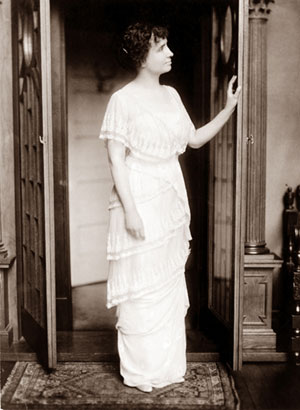 |
Vani: Oh, how lovely is her diary entry of that priceless moment. Her words are so precious.
Geeta: For sure, and after this eureka moment, Helen quickly, stopped and touched the earth and demanded its name by letter and by nightfall she had learned 30 words.
Lata: The first lesson which Helen’s teacher taught her was that every thing in nature is so beautiful and wonderful. Helen says, "She linked my earliest thought with nature and made me feel that birds and flowers and I were happy Peers.” Then one day she asked her teacher the meaning of the word "Love”.
Vani: And how did Anne Sullivan teach her the meaning of this word?
Geeta: Her teacher put her arms gently around Helen and then wrote on Helen's hand "I love Helen", but she could not grasp. Then the teacher drew her closer pointing to her heart and said it is this. But Helen could not touch it to know what it was. Initially, to Helen anything which is beautiful is love, so she asked her teacher whether the smell of the beautiful flower is Love? To which she got a negative answer.
Then she asked her whether the sun shine is love? Because she felt that nothing is more beautiful than sunshine as it makes everything to glow. One or two days after that she was asked to string beads of different sizes in a particular pattern - two big beads and then three small within some symmetry. But Helen went wrong and her teacher pointed out the mistakes and Helen was deeply engrossed in doing the task right. Her teacher just touched her forehead and wrote with her fingers "Think".
 |
In a flash she understood that the word "Think" means some process which was going on in her brain. Here she says this is my first conscious perception of an abstract idea. But her longing to understand the meaning of the word "love" was still lingering in her mind.
Lata: Interestingly, as though nature was playing its part to assist Anne Sullivan, on that day the sun had been under the clouds for a long time with brief showers. Then the sun broke through the clouds with all his splendor. Helen asked again pointing to the direction of heat, "Is this not love?" Her teacher replied in the following manner, “Love is something like clouds that were in the sky before sun came out…you cannot touch the clouds but you feel the rain and know how glad the flowers on the thirsty earth are, to have it after a hot day? You cannot touch love either, but you feel the sweetness that it pours into every thing; without love you would not be happy or want to play.
Here Helen says that the beautiful truth burst upon her mind - and she felt that there were invisible lines stretched between her spirit and that of others. From the beginning Helen's teacher made it a point to speak to her as if she was speaking to a hearing child, but the only difference was that she was speaking to Helen through her fingers. This process continued for several years, for the deaf child does not learn in months but in two or three years.
Vani: Wow, this is absolutely marvelous. Go on Geeta – please, do tell me more.
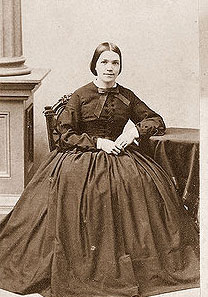 |
Geeta: Yeah sure Vani…. by 1890, when she was just ten, Helen expressed a desire to learn to speak. Somehow she had found out that a little deaf-blind girl in Norway had acquired that ability. Her seeking and determination was not lost on the universe, for another teacher was to enter her world and take her further.
Miss Sarah Fuller of the Horace Mann School became her first speech teacher.
Lata: Even when she was a little girl, Helen Keller said, "Someday I shall go to college." And go to university she did. In 1898 she entered the Cambridge School for Young Ladies to prepare for Radcliffe College. She entered Radcliffe in the fall of 1900 and received her Bachelor of Arts degree cum laude in 1904. Throughout those years and until her own death in 1936, Anne Sullivan was always by her student Helen's side, laboriously spelling book after book and lecture after lecture, into her pupil's hand.
Vani: Wow, what a teacher and what dedication to her pupil! Can’t imagine what a remarkable person she must have been.
Geeta: That’s true, Vani…The next important thing in her education was learning to read. As soon as she could speak few words, her teacher got the reading material - the raised letters on a card board. She quickly learnt that each printed word stood for some object, action or quality.
Of course it was a laborious process for Helen as well as for her teacher, but the whole learning process delighted her - the process of arranging objects according to the sentences she read, for example, the doll is on the bed - the whole thing was a language game for Helen and her teacher played with her; whatever her teacher taught her was always through a poem or a story and thus it created a deep interest in Helen to learn. Even the dreaded Grammar was taught to her in a playful manner. Her teacher never bored her.
 |
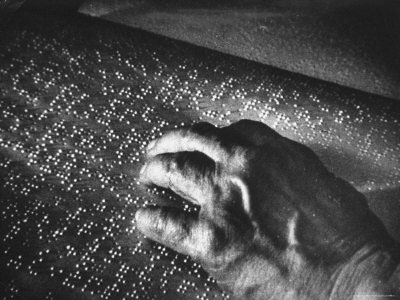 |
Lata: In fact, she stands as a testimony to the Upanishadic declarations that all the senses have their base in atma... the Soul Force.
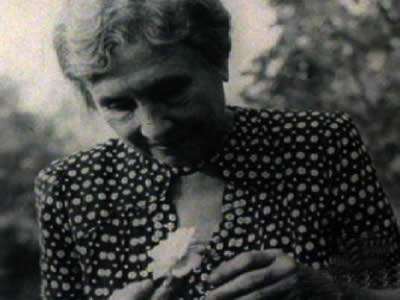 |
Geeta: Remember in our philosophy class, our teacher used to quote from Bhruhadaaranyaka Upanishads which says that eyes do not see, but the atma, ears do not hear but the atma, the Soul Force. In fact, Helen says in her autobiography that she saw and heard through this Soul Force.
Vani: Lata, quite often our beloved Bhagawan has reiterated about the man within which has infinite capabilities.
Lata: Baba speaks of 3 P's – Purity, Patience and Perseverence, and Helen Keller is a personification of all these three virtues.
Vani: Swami also says Self-Confidence is the foundation leading to Self-Sacrifice, giving rise to Self-Satisfaction. Don’t you feel this is what we see in Helen Keller? I feel God is speaking to me through the two of you –
Geeta: Yes, in this case not only the student but also the teacher stands for perseverence. Anne Sullivan is an example of a perfect teacher. Once you know how she struggled to teach a deaf and blind girl with love and determination then you will not be in this depressed mood.
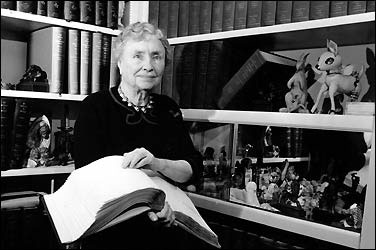 |
Lata: Do you know Vani even Helen and her speech teacher Miss Sarah Fuller worked very hard to articulate her language....It was in 1890 that Helen learnt to speak, a real test of perseverence and strong will. She had to work very hard.
Miss Fuller taught her to speak by placing Helen’s fingers on her lips as she uttered the words. It was a great delight for Helen when she for the first time could utter human speech after failing several times.
Vani: Surprising… and unbelievable… What striking personalities Anne and Helen are, I am speechless now….
Geeta: In fact, she was the first girl to be selected to enter Radcliff University in the shortest period of preparation. It was a great struggle for her teacher to attend the classes along with her and interpret the lessons. There she studied English literature, German, Latin, French and Arithmetic. She passed in all the subjects and received honours in German and English.
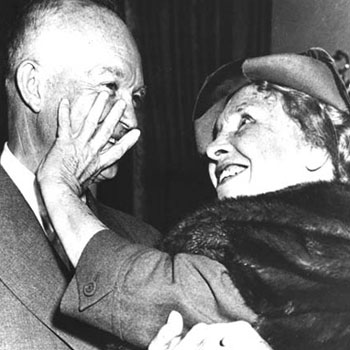 |
Vani: I am sure she must have possessed some unique qualities which enabled her to reach such great heights.
Lata: Yes Vani, the great qualities like optimism, patience, perseverence, love, compassion, selflessness and her commitment to life kept her company throughout her sojourn on earth. That something which was called tasks by others, for Helen it was pleasure….. She saw the brighter side of her disabilities by the fact that she did not have to cross the streets alone.
She had been spared sights and sounds that afflicted those who heard and saw so much. Helen Keller was so optimistic in her attitude that she regarded difficulties as mere new heights to be scaled. Her sense of optimism made her live more richly far more alertly than others.
Mark Twain spoke about Helen when she was just 14 that who ever met her felt a new grace in the human spirit and a new fragrance in human flower.
Geeta: In fact Lata… it was Mark Twain who raised funds for her education after she lost her father…
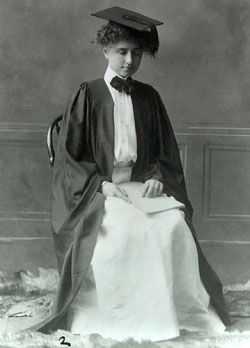 |
Lata: Helen Keller greatly recognised the importance of studying philosophy. She derived consolation from Plato's ideal world which says that the things of the world which she was deprived of seeing are only the copies of the real world of ideas.
Geeta: She compared her life with Spinoza, a Jewish philosopher, who was excommunicated from the society for saying that "God is nature and nature is God”, which was against Jewish faith, but Spinoza enjoyed the bliss and went into the higher realm of existence. Helen felt that even she was like Spinoza, enjoying the happiness even though she was deprived of joy derived from her ears and eyes.
Vani: Our Bhagawan so often speaks of the spirit of optimism which makes life challenging, sweet and blissful.
Lata: Yes Vani…by this quality Helen triumphed over body by mind and lived in the world she wanted. She said that she had broken through the limitations of deafness and blindness which were to be relegated to the outer circle. To her life is worth living only if one moved into a realm of light.
Geeta : Helen Keller's formal schooling ended when she received her B.A. degree, but throughout her life she continued to study and stayed informed on all matters of importance to modern people. In recognition of her wide knowledge and many scholarly achievements, she received honorary doctoral degrees from Temple University and Harvard University, and also from the Universities of Glasgow, Scotland; Berlin, Germany; Delhi, India; and Witwatersrand in Johannesburg, South Africa. She was also an Honorary Fellow of the Educational Institute of Scotland. While still a student at Radcliffe, Helen Keller began a writing career that was to continue on and off for 50 years.
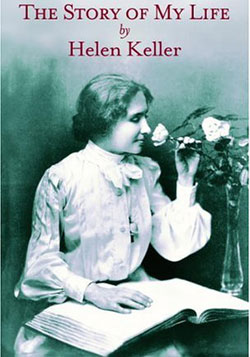 |
Miss Keller's published works include “Optimism, an essay”, "The Story of My Life" and the books: “The World I Live In”, “The Song of the Stone Wall”, “Out of the Dark”, “My Religion”, “Midstream - My Later Life”, “Peace at Eventide”, “Helen Keller in Scotland”, “Helen Keller's Journal”, “Let Us Have Faith”, “Teacher, Anne Sullivan Macy”, and “The Open Door”.
Vani: That’s amazing! How did she write these many books?
Geeta: She first typed the matter on the Braille type writer, then copied it on the ordinary type writer.
Lata: According to her, life is an adventure. She had put her faith in action. Observing her great quality of optimism and her strong will power some of the eminent personalities like Mark Twain, Alexander Graham Bell and others felt that her Soul Force is equivalent to Sathyagraha of Gandhi. In fact everybody felt in her presence wonder, compassion, tenderness and many agreed with Alexander Woolcott that she was the best audience in the world. She made people conscious of their immense power which is hidden in their inner being.
Vani: oh that’s great of her and really inspiring ....but I wonder, did she never feel sad?
Lata: Of course...there were moments in her life when she was depressed but she never wanted to share her sorrow with anybody. When she was overcome by melancholy she would hide herself in the woods or under a boat on the lake side, and again reappear with smiles.
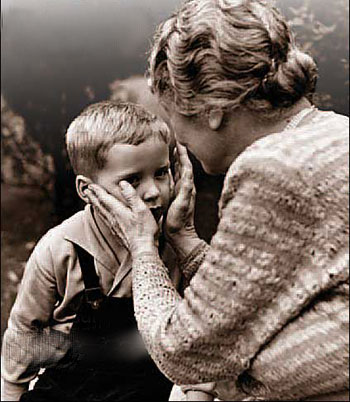 |
Vani: Here I remember our Bhagawan’s statement the world is already sad, do not add to it by sharing your sorrows and stress. Baba says 3/4th of life is filled with happiness and 1/4 is unhappiness, and this 1/4th sorrow is of great purpose. So, one must be optimistic towards life.
Lata: Her teacher commended the qualities of determination and the love of perfection in Helen. Even at the age of 7 she never dropped her task until she mastered it completely and she would not learn a lesson until she understood it totally. Helen was self disciplined, high spirited, self- assured, and had a strong will of her own. Anything that was more difficult excited and interested her. Her disabilities drove her to the deeper levels of will power.
Geeta: Helen used to spend much of her time in thinking of beauty, bravery and magnanimity. She had a fixed determination to regard the world as a place of brightness of free expansion and of irresistible action.
Lata: Another important quality of Helen Keller was her attitude to service. Our Bhagawan speaks often about our obligations and responsibility to society since we are a part of it. We who are gifted in many ways are ignorant but Helen was very conscious of this…Very often she expressed that nothing made her more happy than serving others.
Helen always had this question in mind: "What was her special niche in the world?" She constantly asked herself in the college how she could use her education which cost so much of money and labour through some task so that she could pay her debt to life. She showed her service attitude at the age of 12 when she worked for blind children. She raised $2000 at the age of 13, saved her own pennies and collected funds for a library at her birth place. She published her first book "Story of My Life" at the age of 22, the proceeds from it ($3000) was used for the Foundation of Blind in America.
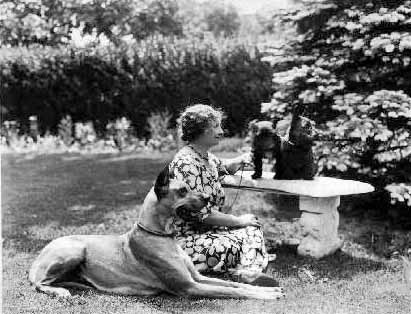 |
Geeta: Helen says, "I seldom think about my limitations, and they never make me sad. Perhaps there is just a touch of yearning at times; but it is vague, like a breeze among the flowers. The wind passes, and the flowers are content. But into the sweet night of my individual blindness has come the call - the urge of others' need. It is as persistent as the love-note which the mother-bird hears when her nestlings are in trouble, and I know that it will never cease until I have done the utmost of which I am capable to help others break down the walls of darkness and pour the sweet waters of joy into the deserts of silence."
She was a strong upholder of socialist party who stood for workers rights and in fact she campaigned for it keeping the goal of helping the workers class. Helen Keller through her talks made people aware that there are many eminent personalities who were blind, as she wanted the people to understand that those without the ability to see are not useless, or burden to the society. Blind can be taught to see through their hands and work as carpenters, road builders, painters, tea tasters, or singers. She lectured in Japan and could raise the funds for the blind. She really made history in Japan.
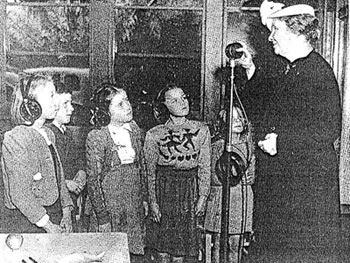 |
Lata: In fact....in 1955, when she was 75 years old, she embarked on one of her longest and most grueling journeys, a 40,000-mile, five-month-long tour through Asia. Wherever she traveled, she brought encouragement to millions of blind people. After the death of her beloved teacher Anne Sullivan in 1936, Polly Thomson who had joined Helen House Hold earlier assumed the task of assisting her work. After Thomson death in 1960, Mrs. Winifred Corbally, a devoted nurse companion helped her until her last day. Helen Keller made her last major public appearance in 1961 at Washington, DC, Lions Clubs International Foundation meeting. On that occasion she received the Lions Humanitarian Award.
Geeta: After that Helen Keller lived quietly at Arcan Ridge, Connecticut. In 1964 she received "Presidential Medal of Freedom". In 1965, she was elected as one of 20 for the Womens’ Hall of Fame at the New York World's Fare. Helen left her mortal coil on June 1, 1968, at Arcan Ridge a few weeks before her 88th birthday.
Senator Lister Hill of Alabama in his Eulogy expressed the feelings of the whole world when he said of Helen Keller,
"She will live on, one of the few, the immortal names not born to die. Her spirit will endure as long as man can read and stories can be told of the woman who showed the world there are no boundaries to courage and faith."
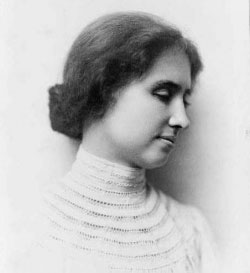 |
Vani: Yes Geeta and Lata... both of you have truly enlightened and enlivened me, I am no longer afflicted with dejection regarding Anita's loss of sight now. I shall draw her out of her dark misery and make sure that she overcomes her disability and lead a rich and meaningful life. I am filled with hope and I shall put in more zeal, enthusiasm and dedication into my teaching and bring out the inner capabilities of my students.
Harnessing the Power of Infinity Packed Within Us
Happiness is not attained through self-gratification but through fidelity to a worthy purpose. There are infinite resources and powers within us which need to be tapped. Let us affirm this over and over to ourselves .What we regard in ourselves as commonplace and uninteresting may have charm and nobility if we look at it through the lens of a strong desire to make the most of the faculties God has given us. It is this desire that unveils capacity.
Truly there is more in us than we dream; for we are parts or shadows of something more intense and greater. We know ourselves only imperfectly. We never fully realize our possibilities, but very near us, touching every one of us, is the Source of all Light, the Sovereign Alchemist who will enable us to transmute the lead of life into gold if we desire it with our whole being, and are willing to work faithfully for its realization.
Dear Reader, did this article help you in anyway? Please share your feelings with us by writing to h2h@radiosai.org mentioning your name and country. Thank you for your time.





